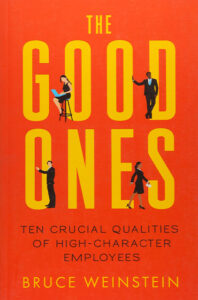At the heart of honorable behavior is a simple concept: character. Character refers to the most important qualities that define a person’s identity, according to Bruce Weinstein in The Good Ones. It is revealed not by words but by actions. Character stands in contrast to other qualities that describe a person but don’t speak to that person’s essential nature.
Ten qualities are associated with high-character employees:
- Honesty
- Accountability
- Care
- Courage
- Fairness
- Gratitude
- Humility
- Loyalty
- Patience
- Presence
Character is developed over time, with consistent effort. Character development is similar to weight training. It takes several trips to the gym every week for months to build strength, and if you stop, your body returns to the way it used to be. By the same token, it takes constant effort to develop and sustain the traits associated with high character.
Smart companies seek to hire and promote high-character people for five reasons:
- They make coming to work a more agreeable experience for everyone, which is good for employee morale.
- They contribute significantly to the organization’s financial health by being highly productive and developing strong relationships with clients.
- They tend to be loyal to their employers.
- They advance the company’s mission of enhancing people’s lives.
- They reflect well on the company, which is valuable for its own sake and also promotes positive word of mouth.
A universal character model is a tall order, but there is evidence that high-character employees are reliably distinguished by these crucial qualities, and it’s in a business’s own interest to place a much greater importance on looking for people with these qualities than most companies do now.
Soundview subscribers get 15-minute summaries of the key concepts in best-selling business books delivered to them every week! Take your career to new heights by staying up-to-date with the trends and ideas affecting business leaders around the globe.





